英语中“钱”的11种表达方法
- 格式:docx
- 大小:706.27 KB
- 文档页数:2
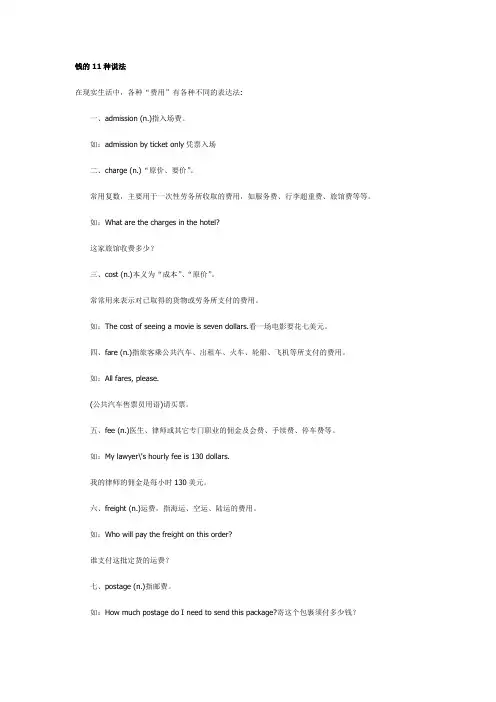
钱的11种说法在现实生活中,各种“费用”有各种不同的表达法:一、admission (n.)指入场费。
如:admission by ticket only凭票入场二、charge (n.)“原价、要价”。
常用复数,主要用于一次性劳务所收取的费用,如服务费、行李超重费、旅馆费等等。
如:What are the charges in the hotel?这家旅馆收费多少?三、cost (n.)本义为“成本”、“原价”。
常常用来表示对已取得的货物或劳务所支付的费用。
如:The cost of seeing a movie is seven dollars.看一场电影要花七美元。
四、fare (n.)指旅客乘公共汽车、出租车、火车、轮船、飞机等所支付的费用。
如:All fares, please.(公共汽车售票员用语)请买票。
五、fee (n.)医生、律师或其它专门职业的佣金及会费、手续费、停车费等。
如:My lawyer\'s hourly fee is 130 dollars.我的律师的佣金是每小时130美元。
六、freight (n.)运费,指海运、空运、陆运的费用。
如:Who will pay the freight on this order?谁支付这批定货的运费?七、postage (n.)指邮费。
如:How much postage do I need to send this package?寄这个包裹须付多少钱?八、rent (n. )土地、建筑物、房舍、机器等定期的租费。
如:The student owed three months’rent for my house.那学生欠我三个月的房租。
九、tip (n.)小费。
如:I gave my barber a fat tip.我给理发师优厚的小费。
十、toll (n.)道路、桥梁、港口、市场的捐税、通行费及电话费等。
如:This month I had to pay 200 yuan toll call.这个月我要缴200元的电话费。
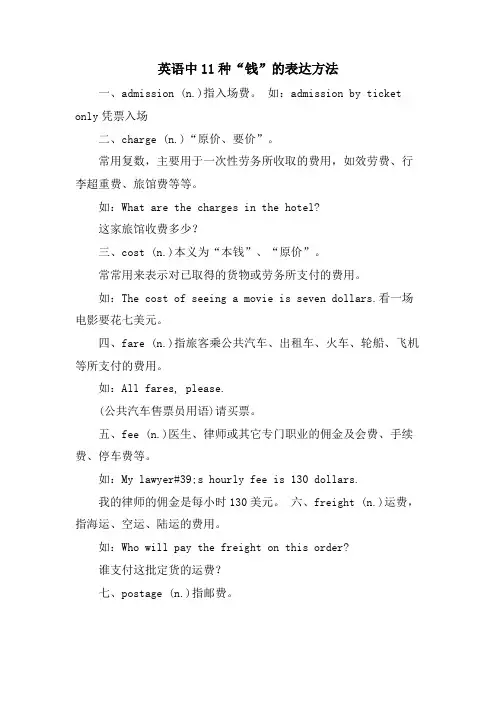
英语中11种“钱”的表达方法一、admission (n.)指入场费。
如:admission by ticket only凭票入场二、charge (n.)“原价、要价”。
常用复数,主要用于一次性劳务所收取的费用,如效劳费、行李超重费、旅馆费等等。
如:What are the charges in the hotel?这家旅馆收费多少?三、cost (n.)本义为“本钱”、“原价”。
常常用来表示对已取得的货物或劳务所支付的费用。
如:The cost of seeing a movie is seven dollars.看一场电影要花七美元。
四、fare (n.)指旅客乘公共汽车、出租车、火车、轮船、飞机等所支付的费用。
如:All fares, please.(公共汽车售票员用语)请买票。
五、fee (n.)医生、律师或其它专门职业的佣金及会费、手续费、停车费等。
如:My lawyer#39;s hourly fee is 130 dollars.我的律师的佣金是每小时130美元。
六、freight (n.)运费,指海运、空运、陆运的费用。
如:Who will pay the freight on this order?谁支付这批定货的运费?七、postage (n.)指邮费。
如:How much postage do I need to send this package?寄这个包裹须付多少钱?八、rent (n. )土地、建筑物、房舍、机器等定期的租费。
如:The student owed three months’rent for my hous e.那学生欠我三个月的房租。
九、tip (n.)小费。
如:I gave my barber a fat tip.我给理发师优厚的小费。
十、toll (n.)道路、桥梁、港口、市场的捐税、通行费及费等。
如:This month I had to pay 200 yuan toll call.这个月我要缴200元的费。
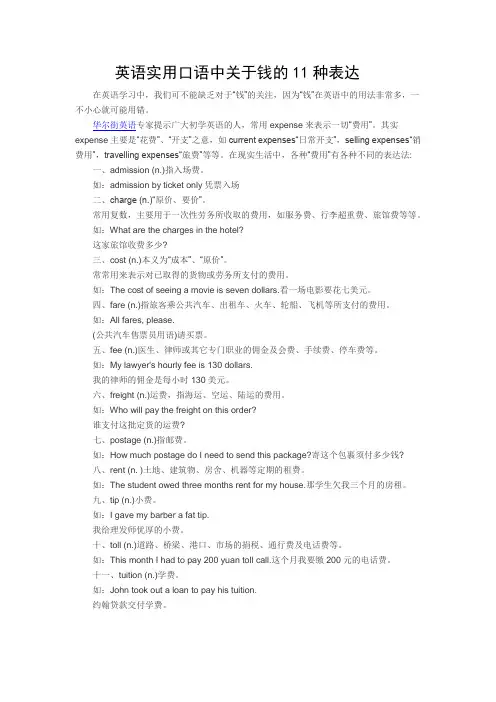
英语实用口语中关于钱的11种表达在英语学习中,我们可不能缺乏对于“钱”的关注,因为“钱”在英语中的用法非常多,一不小心就可能用错。
华尔街英语专家提示广大初学英语的人,常用expense来表示一切“费用”。
其实expense主要是“花费”、“开支”之意,如current expenses“日常开支”,selling expenses“销费用”,travelling expenses“旅费”等等。
在现实生活中,各种“费用”有各种不同的表达法:一、admission (n.)指入场费。
如:admission by ticket only凭票入场二、charge (n.)“原价、要价”。
常用复数,主要用于一次性劳务所收取的费用,如服务费、行李超重费、旅馆费等等。
如:What are the charges in the hotel?这家旅馆收费多少?三、cost (n.)本义为“成本”、“原价”。
常常用来表示对已取得的货物或劳务所支付的费用。
如:The cost of seeing a movie is seven dollars.看一场电影要花七美元。
四、fare (n.)指旅客乘公共汽车、出租车、火车、轮船、飞机等所支付的费用。
如:All fares, please.(公共汽车售票员用语)请买票。
五、fee (n.)医生、律师或其它专门职业的佣金及会费、手续费、停车费等。
如:My lawyer's hourly fee is 130 dollars.我的律师的佣金是每小时130美元。
六、freight (n.)运费,指海运、空运、陆运的费用。
如:Who will pay the freight on this order?谁支付这批定货的运费?七、postage (n.)指邮费。
如:How much postage do I need to send this package?寄这个包裹须付多少钱?八、rent (n. )土地、建筑物、房舍、机器等定期的租费。
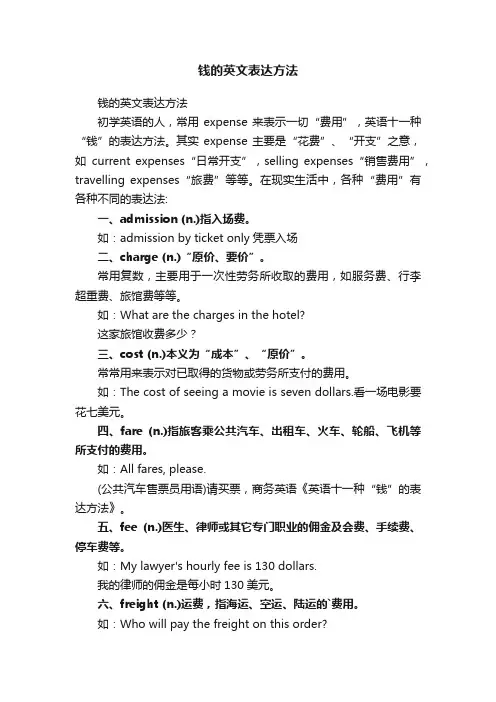
钱的英文表达方法钱的英文表达方法初学英语的人,常用expense来表示一切“费用”,英语十一种“钱”的表达方法。
其实expense主要是“花费”、“开支”之意,如current expenses“日常开支”,selling expenses“销售费用”,travelling expenses“旅费”等等。
在现实生活中,各种“费用”有各种不同的表达法:一、admission (n.)指入场费。
如:admission by ticket only凭票入场二、charge (n.)“原价、要价”。
常用复数,主要用于一次性劳务所收取的费用,如服务费、行李超重费、旅馆费等等。
如:What are the charges in the hotel?这家旅馆收费多少?三、cost (n.)本义为“成本”、“原价”。
常常用来表示对已取得的货物或劳务所支付的费用。
如:The cost of seeing a movie is seven dollars.看一场电影要花七美元。
四、fare (n.)指旅客乘公共汽车、出租车、火车、轮船、飞机等所支付的费用。
如:All fares, please.(公共汽车售票员用语)请买票,商务英语《英语十一种“钱”的表达方法》。
五、fee (n.)医生、律师或其它专门职业的佣金及会费、手续费、停车费等。
如:My lawyer's hourly fee is 130 dollars.我的律师的佣金是每小时130美元。
六、freight (n.)运费,指海运、空运、陆运的`费用。
如:Who will pay the freight on this order?谁支付这批定货的运费?七、postage (n.)指邮费。
如:How much postage do I need to send this package?寄这个包裹须付多少钱?八、rent (n. )土地、建筑物、房舍、机器等定期的租费。
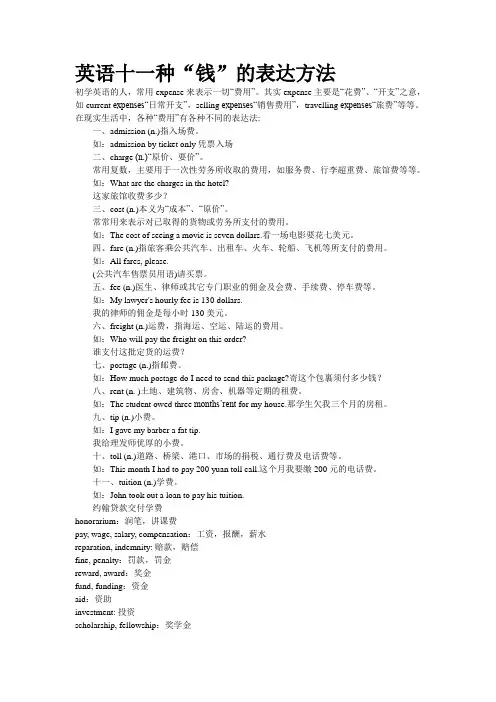
英语十一种“钱”的表达方法初学英语的人,常用expense来表示一切“费用”。
其实expense主要是“花费”、“开支”之意,如current expenses“日常开支”,selling expenses“销售费用”,travelling expenses“旅费”等等。
在现实生活中,各种“费用”有各种不同的表达法:一、admission (n.)指入场费。
如:admission by ticket only凭票入场二、charge (n.)“原价、要价”。
常用复数,主要用于一次性劳务所收取的费用,如服务费、行李超重费、旅馆费等等。
如:What are the charges in the hotel?这家旅馆收费多少?三、cost (n.)本义为“成本”、“原价”。
常常用来表示对已取得的货物或劳务所支付的费用。
如:The cost of seeing a movie is seven dollars.看一场电影要花七美元。
四、fare (n.)指旅客乘公共汽车、出租车、火车、轮船、飞机等所支付的费用。
如:All fares, please.(公共汽车售票员用语)请买票。
五、fee (n.)医生、律师或其它专门职业的佣金及会费、手续费、停车费等。
如:My lawyer's hourly fee is 130 dollars.我的律师的佣金是每小时130美元。
六、freight (n.)运费,指海运、空运、陆运的费用。
如:Who will pay the freight on this order?谁支付这批定货的运费?七、postage (n.)指邮费。
如:How much postage do I need to send this package?寄这个包裹须付多少钱?八、rent (n. )土地、建筑物、房舍、机器等定期的租费。
如:The student owed three months’rent for my house.那学生欠我三个月的房租。
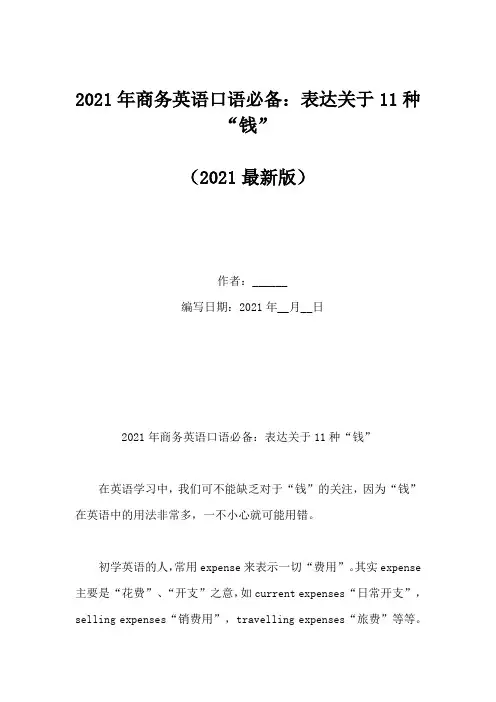
2021年商务英语口语必备:表达关于11种“钱”(2021最新版)作者:______编写日期:2021年__月__日2021年商务英语口语必备:表达关于11种“钱”在英语学习中,我们可不能缺乏对于“钱”的关注,因为“钱”在英语中的用法非常多,一不小心就可能用错。
初学英语的人,常用expense来表示一切“费用”。
其实expense 主要是“花费”、“开支”之意,如current expenses“日常开支”,selling expenses“销费用”,travelling expenses“旅费”等等。
在现实生活中,各种“费用”有各种不同的表达法:一、admission (n.)指入场费。
如:admission by ticket only凭票入场二、charge (n.)“原价、要价”。
常用复数,主要用于一次性劳务所收取的费用,如服务费、行李超重费、旅馆费等等。
如:What are the charges in the hotel?这家旅馆收费多少?三、cost (n.)本义为“成本”、“原价”。
常常用来表示对已取得的货物或劳务所支付的费用。
如:The cost of seeing a movie is seven dollars.看一场电影要花七美元。
四、fare (n.)指旅客乘公共汽车、出租车、火车、轮船、飞机等所支付的费用。
如:All fares, please.(公共汽车售票员用语)请买票。
五、fee (n.)医生、律师或其它专门职业的佣金及会费、手续费、停车费等。
如:My lawyer’s hourly fee is 130 dollars.我的律师的佣金是每小时130美元。
六、freight (n.)运费,指海运、空运、陆运的费用。
如:Who will pay the freight on this order?谁支付这批定货的运费?七、postage (n.)指邮费。
如:How much postage do I need to send this package?寄这个包裹须付多少钱?八、rent (n. )土地、建筑物、房舍、机器等定期的租费。
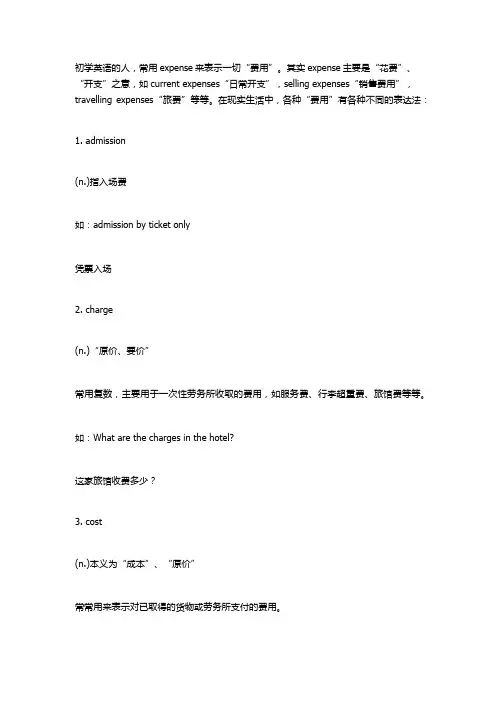
初学英语的人,常用expense来表示一切“费用”。
其实expense主要是“花费”、“开支”之意,如current expenses“日常开支”,selling expenses“销售费用”,travelling expenses“旅费”等等。
在现实生活中,各种“费用”有各种不同的表达法:1. admission(n.)指入场费如:admission by ticket only凭票入场2. charge(n.)“原价、要价”常用复数,主要用于一次性劳务所收取的费用,如服务费、行李超重费、旅馆费等等。
如:What are the charges in the hotel?这家旅馆收费多少?3. cost(n.)本义为“成本”、“原价”常常用来表示对已取得的货物或劳务所支付的费用。
如:The cost of seeing a movie is seven dollars.看一场电影要花七美元。
4. freight(n.)运费,指海运、空运、陆运的费用如:Who will pay the freight on this order?谁支付这批定货的运费?5. postage(n.)指邮费如:How much postage do I need to send this package?寄这个包裹须付多少钱?6. fare(n.)指旅客乘公共汽车、出租车、火车、轮船、飞机等所支付的费用如:All fares, please.(公共汽车售票员用语)请买票。
7. fee(n.)医生、律师或其它专门职业的佣金及会费、手续费、停车费等如:My lawyer's hourly fee is 130 dollars.我的律师的佣金是每小时130美元。
8. rent(n. )土地、建筑物、房舍、机器等定期的租费如:The student owed three months’rent for my house.那学生欠我三个月的房租。

英语中11种“钱”的表达方法在英语中,“钱”这个主题涉及的词汇非常丰富。
除了普通的“money”以外,还有很多其他的表达方式。
让我们来了解一下英语中11种“钱”的表达方法。
1. Money“Money”是最基本的表达方式,指的是货币、钱财的含义。
它是最普通的、最常用的表达方式。
例如:•I need to save some money for my trip.•They spent a lot of money on that wedding.2. Cash“Cash”指的是硬币和纸币。
习惯上,我们会使用“cash”来代指现金交易,而不是使用信用卡或支票等其他支付方式。
例如:•I don’t have any cash on me right now, can I use my card to pay?•The store only accepts cash payments.3. Dough“Dough”一词是口语中常用的一个词汇,指的是钞票或金钱。
它来源于烘焙中做面团时用到的面粉或“dough”。
例如:•Sam makes a lot of dough working for that company.•You need to have some dough if you want to travel.4. Loot“Loot”通常用于指偷来的或赚来的钱财,这个词汇可以带有一些负面的含义。
例如:•The thief made off with a lot of loot from the store.•The new CEO has taken a lot of loot out of the company.5. Dough-re-mi“Dough-re-mi”是一个粗俗的术语,指的是钱。
它源自于音乐谱表中常用的表达方式,在此被用于代替“cash”或“money”。
例如:•He has a lot of dough-re-mi from his music career.•I need to come up with some extra dough-re-mi to pay for this project.6. Silver“Silver”在英语中既可以指银子,也可以指银钞票或银行卡。
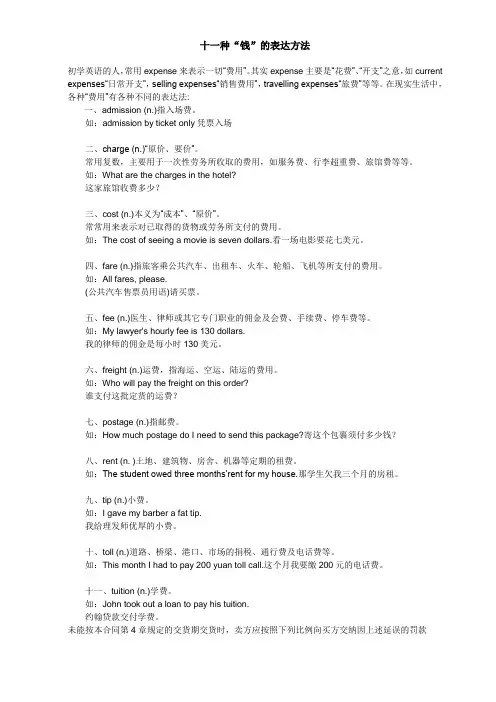
十一种“钱”的表达方法初学英语的人,常用expense来表示一切“费用”。
其实expense主要是“花费”、“开支”之意,如current expenses“日常开支”,selling expenses“销售费用”,travelling expenses“旅费”等等。
在现实生活中,各种“费用”有各种不同的表达法:一、admission (n.)指入场费。
如:admission by ticket only凭票入场二、charge (n.)“原价、要价”。
常用复数,主要用于一次性劳务所收取的费用,如服务费、行李超重费、旅馆费等等。
如:What are the charges in the hotel?这家旅馆收费多少?三、cost (n.)本义为“成本”、“原价”。
常常用来表示对已取得的货物或劳务所支付的费用。
如:The cost of seeing a movie is seven dollars.看一场电影要花七美元。
四、fare (n.)指旅客乘公共汽车、出租车、火车、轮船、飞机等所支付的费用。
如:All fares, please.(公共汽车售票员用语)请买票。
五、fee (n.)医生、律师或其它专门职业的佣金及会费、手续费、停车费等。
如:My lawyer's hourly fee is 130 dollars.我的律师的佣金是每小时130美元。
六、freight (n.)运费,指海运、空运、陆运的费用。
如:Who will pay the freight on this order?谁支付这批定货的运费?七、postage (n.)指邮费。
如:How much postage do I need to send this package?寄这个包裹须付多少钱?八、rent (n. )土地、建筑物、房舍、机器等定期的租费。
如:The student owed three months’rent for my house.那学生欠我三个月的房租。

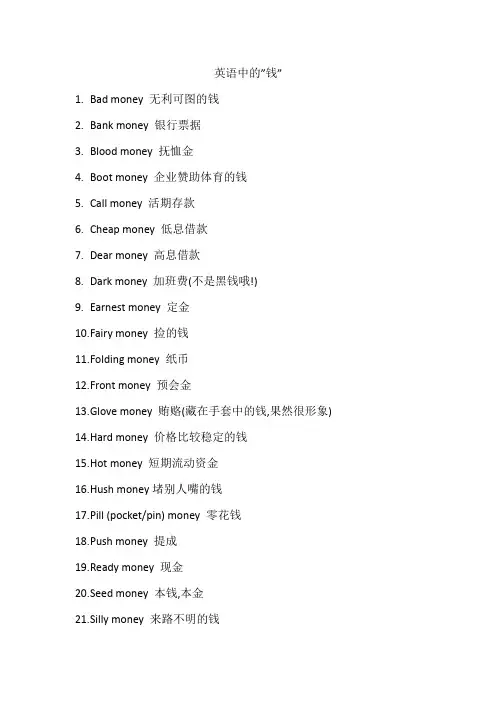
英语中的”钱”
1.Bad money 无利可图的钱
2.Bank money 银行票据
3.Blood money 抚恤金
4.Boot money 企业赞助体育的钱
5.Call money 活期存款
6.Cheap money 低息借款
7.Dear money 高息借款
8.Dark money 加班费(不是黑钱哦!)
9.Earnest money 定金
10.F airy money 捡的钱
11.F olding money 纸币
12.F ront money 预会金
13.G love money 贿赂(藏在手套中的钱,果然很形象)
14.H ard money 价格比较稳定的钱
15.H ot money 短期流动资金
16.H ush money堵别人嘴的钱
17.P ill (pocket/pin) money 零花钱
18.P ush money 提成
19.R eady money 现金
20.S eed money 本钱,本金
21.S illy money 来路不明的钱
22.S mart money 了解内情的人
23.T able money 餐费
24.T all money 大笔的财富(钱钱堆高高)
25.T rust money委托金
26.T ip 小费。
11种”钱“的表达方法11种”钱“的表达方法初学英语的人,常用expense来表示一切“费用”。
其实expense主要是“花费”、“开支”之意,如current expenses“日常开支”,selling expenses“销售费用”,travelling expenses“旅费”等等。
在现实生活中,各种“费用”有各种不同的表达法:一、admission (n.)指入场费。
如:admission by ticket only凭票入场二、charge (n.)“原价、要价”。
常用复数,主要用于一次性劳务所收取的费用,如服务费、行李超重费、旅馆费等等。
如:What are the charges in the hotel?三、cost (n.)本义为“成本”、“原价”。
常常用来表示对已取得的货物或劳务所支付的费用。
如:The cost of seeing a movie is seven dollars.看一场电影要花七美元。
四、fare (n.)指旅客乘公共汽车、出租车、火车、轮船、飞机等所支付的费用。
如:All fares, please. (公共汽车售票员用语)请买票。
五、fee (n.)医生、律师或其它专门职业的佣金及会费、手续费、停车费等。
如:My lawyer's hourly fee is 130 dollars.六、freight (n.)运费,指海运、空运、陆运的费用。
如:Who will pay the freight on this order?七、postage (n.)指邮费。
如:How much postage do I need to send this package?八、rent (n. )土地、建筑物、房舍、机器等定期的租费。
如:The student owed three months’rent for my house.那学生欠我三个月的房租。
九、tip (n.)小费。
英语十一种“钱”的表达方法初学英语的人,常用expense来表示一切“费用”。
其实expense主要是“花费”、“开支”之意,如current expenses“日常开支”,selling expenses“销售费用”,travelling expenses “旅费”等等。
在现实生活中,各种“费用”有各种不同的表达法:一、admission(n.)指入场费。
如:admission by ticket only凭票入场二、charge(n.)“原价、要价”。
常用复数,主要用于一次性劳务所收取的费用,如服务费、行李超重费、旅馆费等等。
如:What are the charges in the hotel?这家旅馆收费多少?三、cost(n.)本义为“成本”、“原价”。
常常用来表示对已取得的货物或劳务所支付的费用。
如:The cost of seeing a movie is seven dollars.看一场电影要花七美元。
四、fare(n.)指旅客乘公共汽车、出租车、火车、轮船、飞机等所支付的费用。
如:All fares, please.(公共汽车售票员用语)请买票。
五、fee(n.)医生、律师或其它专门职业的佣金及会费、手续费、停车费等。
如:My lawyer's hourly fee is 130 dollars.我的律师的佣金是每小时130美元。
六、freight(n.)运费,指海运、空运、陆运的费用。
如:Who will pay the freight on this order?谁支付这批定货的运费?七、postage(n.)指邮费。
如:How much postage do I need to send this package?寄这个包裹须付多少钱?八、rent(n. 土地、建筑物、房舍、机器等定期的租费。
如:The student owed three months'rent for my house.那学生欠我三个月的房租。
英语中11种“钱”的表达方式发布时间:2011-04-29 发布人:初学英语的人,常用expense来表示一切“费用”。
其实expense主要是“花费”、“开支”之意,如current expenses“日常开支”,selling expenses“销售费用”,travelling expenses“旅费”等等。
在现实生活中,各种“费用”有各种不同的表达法:一、admission (n.)指入场费如:admission by ticket only凭票入场二、charge (n.)“原价、要价”常用复数,主要用于一次性劳务所收取的费用,如服务费、行李超重费、旅馆费等等。
如:What are the charges in the hotel? 这家旅馆收费多少?三、cost (n.)本义为“成本”、“原价”。
常常用来表示对已取得的货物或劳务所支付的费用。
如:The cost of seeing a movie is seven dollars.看一场电影要花七美元。
四、fare (n.)指旅客乘公共汽车、出租车、火车、轮船、飞机等所支付的费用。
如:All fares, please. (公共汽车售票员用语)请买票。
五、fee (n.)医生、律师或其它专门职业的佣金及会费、手续费、停车费等。
如:My lawyer's hourly fee is 130 dollars. 我的律师的佣金是每小时130美元。
六、freight (n.)运费,指海运、空运、陆运的费用。
如:Who will pay the freight on this order? 谁支付这批定货的运费?七、postage (n.)指邮费。
如:How much postage do I need to send this package?寄这个包裹须付多少钱?八、rent (n.) 土地、建筑物、房舍、机器等定期的租费。
如:The student owed three months’rent for my house.那学生欠我三个月的房租。
號99的—种表达方法□山东邢雪君初学英语的人,常用expense来表示一切“费用”。
其实expense主要是“花费”、"开支"之意,如current expenses“日常开支",selling expenses"销售费用",traveling expenses“旅费”等等。
在现实生活中,各种“费用”有各种不同的表达法:一、admission(n.)指入场费admission by ticket only凭票入场二、charge(n.)“原价、要价"常用复数,主要用于一次性劳务所收取的费用,如服务费、行李超重费、旅馆费等。
女口:What are the charges in the hotel?这家旅馆收费多少?三、cost(n.)本义为“成本”、“原价”常常用来表示对已取得的货物或劳务所支付的费用。
如:The cost of seeing a movie is seven dollars.看一场电影要花七美兀o四、fare(n.)指旅客乘公共汽车、出租车、火车、飞机等所支付的费用女口:All fares,please.(公共汽车售票员用语)请买票。
五、fee(n.)医生、律师或其它专门职业的佣金及会费、手续费等。
如:My lawyer's hourly fee is130dollars.噩我的律师的佣金是每小时130美元。
六、Hight(n.)运费,指海运、空运、陆运的费用如:Who will pay the freight on this order?谁支付这批订货的费用?七、p ostage(n.)指邮费如:How much postage do I need to send this package?寄这个包裹须付多少钱?八、rent(n.)土地、建筑物、房舍、机器等定期的租费如:The student owed three months'rent for my house.那学生欠我三个月的房租。
英语十一种“钱”的表达方法初学英语的人,常用expense来表示一切“费用”。
其实expense主要是“花费”、“开支”之意,如current expenses“日常开支”,selling expenses“销售费用”,travelling expenses“旅费”等等。
在现实生活中,各种“费用”有各种不同的表达法:一、admission (n.)指入场费。
如:admission by ticket only凭票入场二、charge (n.)“原价、要价”。
常用复数,主要用于一次性劳务所收取的费用,如服务费、行李超重费、旅馆费等等。
如:What are the charges in the hotel?这家旅馆收费多少?三、cost (n.)本义为“成本”、“原价”。
常常用来表示对已取得的货物或劳务所支付的费用。
如:The cost of seeing a movie is seven dollars.看一场电影要花七美元。
四、fare (n.)指旅客乘公共汽车、出租车、火车、轮船、飞机等所支付的费用。
如:All fares, please.(公共汽车售票员用语)请买票。
五、fee (n.)医生、律师或其它专门职业的佣金及会费、手续费、停车费等。
如:My lawyer"s hourly fee is 130 dollars.我的律师的佣金是每小时130美元。
六、freight (n.)运费,指海运、空运、陆运的费用。
如:Who will pay the freight on this order?谁支付这批定货的运费?七、postage (n.)指邮费。
如:How much postage do I need to send this package?寄这个包裹须付多少钱?八、rent (n. )土地、建筑物、房舍、机器等定期的租费。
如:The student owed three months’rent for my house.那学生欠我三个月的房租。
教你用英语的二十六种方法说钱
1.bad money 无利可图的钱
2.bank money 银行票据
3.blood money 抚恤金
4.boot money 企业赞助体育的钱
5.call money 活期存款
6.cheap money 低息借款
7.dear money 高息借款
8.dark money 加班费
9.earnest money 定金
10.fairy money 捡的钱
11.folding money 纸币
12.front money 预会金
13.glove money 贿赂
14.good money 有利可图的钱
15.hard money 价格比拟稳定的钱(例如人民币,在亚洲经济中的作用)
16.hot money 短期流动资金
17.hush money 赌别人嘴的钱
18.pill money 零花钱(pocket money/pin money)
19.push money 提成
20.ready money 现金
21.seed money 本钱,本金
22.silly money 来路不明的钱
23.smart money 了解内情的人
24.table money 餐费
25.tall money 大笔的财富
26.trust money 委托金。
英语中“钱”的11种表达方法
初学英语的人,常用expense来表示一切“费用”。
其实expense主要是“花费”、“开支”之意,如current expenses“日常开支”,selling expenses“销售费用”,travelling expenses “旅费”等等。
在现实生活中,各种“费用”有各种不同的表达法:
一、admission (n.)指入场费。
如:admission by ticket only凭票入场
二、charge (n.)“原价、要价”。
常用复数,主要用于一次性劳务所收取的费用,如服务费、行李超重费、旅馆费等等。
如:What are the charges in the hotel?
这家旅馆收费多少?
三、cost (n.)本义为“成本”、“原价”。
常常用来表示对已取得的货物或劳务所支付的费用。
如:The cost of seeing a movie is seven dollars.看一场电影要花七美元。
四、fare (n.)指旅客乘公共汽车、出租车、火车、轮船、飞机等所支付的费用。
如:All fares, please.
(公共汽车售票员用语)请买票。
五、fee (n.)医生、律师或其它专门职业的佣金及会费、手续费、停车费等。
如:My lawyer's hourly fee is 130 dollars.
我的律师的佣金是每小时130美元。
·外贸英语(运输之提单种类)
六、freight (n.)运费,指海运、空运、陆运的费用。
如:Who will pay the freight on this order?
谁支付这批定货的运费?
七、postage (n.)指邮费。
如:How much postage do I need to send this package?寄这个包裹须付多少钱?
八、rent (n. )土地、建筑物、房舍、机器等定期的租费。
如:The student owed three months’rent for my house.那学生欠我三个月的房租。
九、tip (n.)小费。
如:I gave my barber a fat tip.
我给理发师优厚的小费。
十、toll (n.)道路、桥梁、港口、市场的捐税、通行费及电话费等。
如:This month I had to pay 200 yuan toll call.这个月我要缴200元的电话费。
十一、tuition (n.)学费。
如:John took out a loan to pay his tuition.
约翰贷款交付学费。